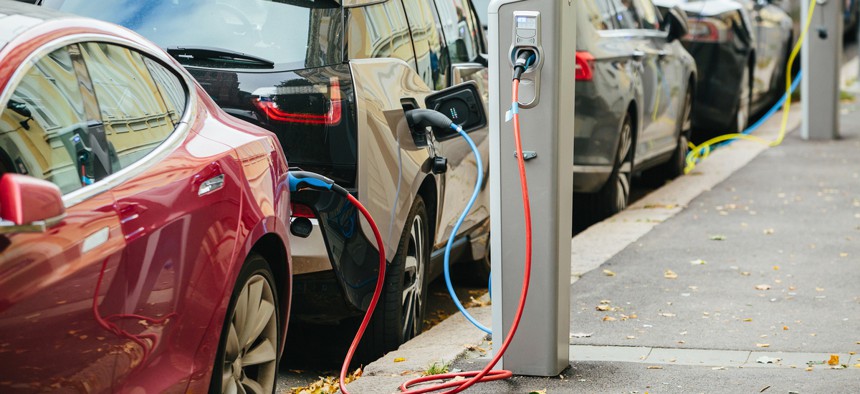A State Restarts Its Electric Vehicle Rebates

Since 2014, Massachusetts has allocated more than $31 million to the purchase of roughly 15,000 electric vehicles. shutterstock

Connecting state and local government leaders
Massachusetts extended its rebate program through at least 2021 after legislators provided funding for the program in the most recent budget.
Massachusetts revived its electric vehicle rebate program on Jan. 1 after legislators provided an infusion of cash for the incentive, Gov. Charlie Baker announced this week.
The MOR-EV rebate program, administered by the state’s Department of Energy Resources, began in 2014 but was canceled by the Baker administration at the end of September after an influx of applications depleted its funding stores. Rebates began being phased out on Sept. 30 and were set to end entirely on Dec. 31.
The state’s new budget, signed by Baker in December, provides an additional $27 million for the program, enough to fund it through at least the end of 2021, Baker said.
“The MOR-EV program has successfully spurred the growth of clean, affordable, and environmentally friendly electric vehicles across the Commonwealth, and we are proud to be able to extend the program to continue to encourage car buyers to go electric,” Baker said in a statement. He said his administration believes switching to electric transportation options is a key part of fighting climate change.
The funding is provided through the Regional Greenhouse Gas Initiative, a multi-state cap-and-invest program designed to lower emissions from power plants and help Massachusetts meet its greenhouse gas emission goals for the private sector.
The program offers a $2,500 rebate for qualifying battery electric vehicles purchased for less than $50,000, and a $1,500 rebate for plug-in electric vehicles with an all-electric range of 25 miles or more and a sales price of less than $50,000. Under the rules of the program extension, zero-emission motorcycles will no longer be eligible.
Since 2014, the state has spent roughly $31 million toward the purchase of more than 15,000 electric vehicles, which have reduced greenhouse gas emissions by an estimated 39,000 metric tons annually, according to statistics from the program. Tesla is the most popular maker in the state, with 5,857 cars on the road, followed by Chevrolet (3,287), Toyota (1,496) and Nissan (959).
The program’s extension is a mark of bipartisanship in a state with a Republican governor and a legislature controlled by Democrats, said state Sen. Michael J. Rodrigues, a Democrat from Westport and the chair of the Senate Committee on Ways and Means.
“Now more than ever, the legislature and the administration must work together in partnership to aggressively confront the impacts of climate change,” he said in a statement. “The increased funding to bolster the state’s electric vehicle rebate program is a symbol of this partnership and a reflection of our shared commitment to take meaningful steps to address climate change, reduce our carbon footprint and advance a clean energy future for our Commonwealth.”
Dozens of states offer rebates for electric vehicle owners, including discounted energy costs and incentives for business owners who add charging infrastructure to their property, according to the U.S. Department of Energy. The Internal Revenue Service also offers a federal tax credit for the purchase of a new electronic vehicle, ranging from $2,500 to $7,500 depending on the size of the vehicle and its battery capacity.
Kate Elizabeth Queram is a Staff Correspondent for Route Fifty and is based in Washington, D.C.

NEXT STORY: Voting Rights Restoration Gives Felons a Voice in More States




